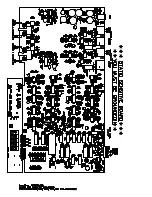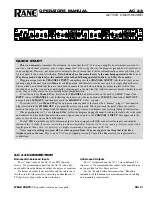
2-Way, 3-Way
4-Way Crossovers
223/223XL - 234/234XL
F
EATURES
X
10 O
PERATION
P
OLARITY
S
WITCH
L
OW
F
REQUENCY
S
UMMING
crossover, as this may cause severe damage not covered under the dbx
warranty. Connect the power cord to the crossover first, then to a power
source that is properly grounded. Never lift the ground as a shock hazard
may result.
After you have safely plugged in the crossover, turn on the source
device(s). Turn the amplifiers’ outputs all the way down (-
∞
) and turn on
the amplifiers. All of the elements of your sound system should now be
on, and the amplifiers should be turned all the way down. Turn the source
device to its nominal operating level, sending a nominal (average) level to
the 234/234XL-223/223XL. Slowly turn up the amplifiers’ outputs until you
can hear signal at a comfortable volume. Make adjustments as you
desire.
If you are using your system in stereo 2-way or 3-way mode, the needed
crossover frequency may be higher than 960 Hz, making it necessary to
set the x10 switch to the active position. This changes the range of oper-
ation of the frequency selector from 45-960 Hz to 450 Hz to 9.6 kHz. All
other frequency selectors remain the same. When using the X10 switch,
ALWAYS ensure that the amplifiers feeding all speaker systems are
turned off or that the input gain controls on the power amplifiers are
turned down before changing the setting of the X10 switch. Not doing so
may send a spurious signal to the outputs of the crossover when the X10
switch is engaged, and may damage speaker systems which are pow-
ered at the time of the spurious signal.
Every output is equipped with a polarity (Ø) reverse switch on the front
panel. When speakers are not “in phase”, the frequency response of the
system is compromised, particularly in the low frequencies. Out of phase
signals can also cause “comb-filtering” in the high frequencies. The polar-
ity switch is extremely useful for fine tuning your sound system for peak
performance. An LED is activated when the output polarity is reversed.
The other feature accessed on the back panel is “low frequency sum-
ming”. This is useful with systems that utilize mono subwoofers.
Activating the LF sum switch “sums” the low frequencies of both the left
and right inputs. The sum is sent to channel one’s low output marked “LF
SUM”, while channel two’s low output is not used, and channel two’s
phase invert led is disabled, indicating it is not operational in “LF Sum”
mode. The summed low frequencies represent all the low frequencies of
both the left and right inputs, and since lows are generally non-directional
8
®






















